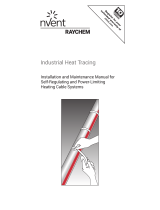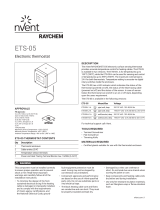Page is loading ...

Pentair
DESCRIPTION
The nVent RAYCHEM E507S-LS thermostat is designed for controlling
heat-tracing systems in hazardous locations. TheE507S-LS can be
used to control heat-tracing circuits in apipe-sensing mode (see
Figure 1 on back page), to indicate low-temperature (see Figure 2) or
high-temperature (see Figure 3) alarm conditions, or to control the coil
on a contactor (see Figure 4).
APPROVALS
SPECIFICATIONS
Enclosure NEMA 4, 7, 9, lacquer-coated cast-aluminum
housing, stainless-steel hardware
Entries One 3/4 in. NPT conduit hub
Set point range 25°F to 325°F (–4°C to 163°C)
Sensor exposure
limits
–40°F to 420°F (–40°C to 215°C)
Housing exposure
limits
–40°F to 140°F (–40°C to 60°C)
Switch SPDT
Electrical rating 22 A at 125/250/480 Vac
Accuracy ±6°F (±3.3°C)
Deadband 2°F to 12°F (1.1°C to 6.7°C) above actuation
temperature
Set point
repeatability
±3°F (±1.7°C)
Sensor type Fluid-filled (silicone) bulb and 9 ft (2.7 m)
capillary
Sensor material 300 series stainless steel
Connection
terminals
Screw terminals, 10–14 AWG (2–5 mm
2
)
Class I, Div. 1 and 2, Groups B, C, D
Class II, Div. 1 and 2, Groups E, F, G
Class III
Hazardous locations
This component is an electrical device. It must be installed correctly to ensure
proper operation and to prevent shock or fire. Read these important warnings
and carefully follow all the installation instructions.
Component approvals and performance are based on the use of specified parts
only. Do not use substitute parts or vinyl electrical tape to make connections.
WARNING:
4.0 in. (102 mm)
4.5 in. (114 mm)
Ø.28 in. (7 mm)
mounting hole
(4X)
4.5 in.
(114 mm)
6.6 in.
(168 mm)
4.0 in.
(102 mm)
8.0 in.
(202 mm)
Adjusting knob
Removable knob cover
4.0 in. (102 mm)
1.2 in. (30 mm)
2.0 in.
(50 mm)
3⁄4 in. NPT conduit entry
0.3 in. (9 mm)
Terminal
block
Pentair
E507S-LS
Line-Sensing Thermostat for Hazardous Locations
Installation Instructions

Figure 4. Contactor control
Figure 1. Pipe-sensing
C
NO NC
For switching heat-tracing loads greater than 22 A
or switching multiple heat-tracing circuits.
Ø
G
G
N
ØØ
Heating
Cable
Power
connection
Thermostat bulb
(see "Positioning"
instructions above
for mounting details)
Braid
Control
thermostat
Control
thermostat
GFEPD
C
C
NONC
NONC
Thermostat bulb
(see "Positioning"
instructions above
for mounting details)
or
208-V or 240-V supply – 240-V heater
120-V supply – 120-V heater
277-V supply – 240-V heater
Ø
C
G
C
N
A
N
B
N
C
Ø
B
Ø
A
120-V or
277-V
coil
Braid
120- V supply – 120-V heater or
277-V supply – 240-V heater
GFEPD
Figure 2. Low-temperature alarm
C
NO NC
Ø
G
N
ØØ
Alarm
Thermostat bulb
(see "Positioning"
instructions above
for mounting details)
Control
thermostat
GFEPD
or
208-V or 240-V supply
120-V supply – 120-V heater
277-V supply – 240-V heater
Figure 3. High-temperature alarm
C
NO NC
Ø
G
N
ØØ
Alarm
Thermostat bulb
(see "Positioning"
instructions above
for mounting details)
Control
thermostat
GFEPD
or
208-V or 240-V supply
120-V supply – 120-V heater
277-V supply – 240-V heater
Heating
cable C
Heating
cable B
Heating
cable A
WIRING
INSTALLING THE THERMOSTAT
1. Verify that the thermostat is
suitable for the area where it is to be
installed.
2. Check the line voltage and the
heat-tracing load to ensure that the
thermostat ratings are not exceeded.
3. Mount the unit using unistrut or the RAYCHEM universal
mounting bracket (UMB-263757) in a position that prevents
condensation from draining into the enclosure from the
connecting conduit (see diagram above).
POSITIONING THE SENSOR BULB
4. Position the bulb in the
lower quadrant of the pipe
as shown in the diagrams
to the left. Place the bulb
at least three feet from
pipe supports, valves, or
other heat sinks; protect the
capillary from kinks or bends
less than 1⁄2 inch in radius.
5. Tape the bulb firmly to the pipe with AT-180 aluminum tape,
making sure there is no air space between the bulb and pipe.
Donot overlap the bulb and heating cable with the same piece
ofAT-180 tape.
6. For metal-tank-wall sensing, use the BCK-35 bulb clamp
(purchased separately) and install the clamp per the instructions
provided. Make sure there is no air space between the tank wall
and the bulb.
For installation on plastic tanks, contact nVent at (800) 545-6258.
SETTING THE THERMOSTAT
7. Set the thermostat dial to the desired temperature, then finish
wiring.
8. Complete insulating. Do not turn the system on until the bulb is
covered with thermal insulation.
9. Fill the piping or tank. Once the thermostat has begun to cycle,
check the fluid temperature with an immersed thermostat (best
for plastic systems) or an accurate temperature indicator. Adjust
the dial setting if necessary.
Conduit
drain
Pentair
90
Heating cable
Control thermostat bulb
AT-180 tape
AT-180 tape
Heating cable
Control thermostat bulb
Double traced
Single traced
North America
Tel +1.800.545.6258
Fax +1.800.527.5703
Europe, Middle East, Africa
Tel +32.16.213.511
Fax +32.16.213.604
Asia Pacific
Tel +86.21.2412.1688
Fax +86.21.5426.3167
Latin America
Tel +1.713.868.4800
Fax +1.713.868.2333
©2018 nVent. All nVent marks and logos are owned or licensed by nVent Services GmbH or its affiliates. All other trademarks are the property of their respective owners.
nVent reserves the right to change specifications without notice.
Raychem-IM-H56913-E507SLS-EN-1805 PN 137863
nVent.com
/

